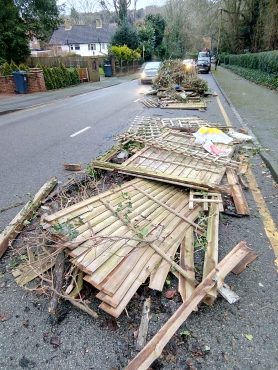Fly-tipping: Why it happens and what we can do to stop it.

Nothing quite gets residents riled like fly-tipping, or illegal dumping by its other name.
It is not only unsightly, but can be dangerous. Waste that is difficult or costly to dispose of, such as asbestos or toxic chemicals, can be dumped illegally by the unscrupulous. It can pollute waterways, damage habitats and kill wildlife.
Although the dumping of domestic rubbish, including unwanted mattresses and white goods, is certainly a problem, it is the commercial, or trade waste, that poses the greatest challenge. There has been a 38% increase in fly-tipping in the past ten years, with a corresponding fall in prosecutions.
Why fly-tip?
A move away from landfill and tightening of laws surrounding waste, caused costs of disposal to rise sharply. Many items, such as paints, have to disposed of in specialist sites.
Fly-tipping is cost-free to the perpetrators, unless they are caught and prosecuted of course, and no time is wasted going to a proper facility. Dumping in a quiet lane is easy and usually without consequences.
Unfortunately, the cost to council taxpayers is huge.
Stopping fly-tippers
Residents are reminded that if a tradesperson does work for them and fly-tips the waste, the resident could be held liable, and even fined.
Don’t deal with cold callers who offer to take waste away unless they have a valid Waste Carriers License.
Make sure that tradesmen are responsible for the waste created and agree to dispose of it responsibly.
For larger amounts of waste, skips are best, as they are regulated and sent to waste recovery centres.
Catching fly-tippers
If you see someone fly-tipping, make a note of:
- how many people are involved and what they look like
- what has been tipped – how much and what it looks like
- details of any vehicles involved including make, colour and registration number if possible
Never approach fly-tippers as they may become violent.
Reporting fly-tipping
Report the fly-tip using these steps (from Croydon Council’s website):
- Don’t touch the waste – it may contain syringes, toxic chemicals or other hazardous substances.
- Don’t disturb the site – there may be evidence that could help identify the fly-tippers and lead to their prosecution.
- Visually try to work out what the waste consists of and how much there is.
- Make a note of the day, date and time you saw the tipping, its exact location and whether it’s in or near water.
- Take a photo if it’s safe and possible to do so.
- Email your location, photos and your contact details to public.safety@croydon.gov.uk

KENDRA RECOMMENDS the use the Love Clean Streets app (Android) (Apple) on your smartphone to report fly-tipping, and other environmental incidents. You can report direct from your phone with the location and photographs.

